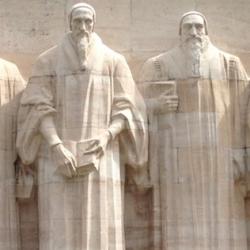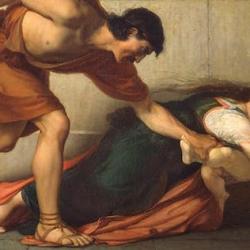For some, the “two kingdoms” political theology of Luther and Calvin is the essence of Reformation political theology. Francis Oakley argues (Watershed of Modern Politics) that it was an unstable early position that later Reformers couldn’t sustain and eventually abandoned.
Luther claimed that Christians existed “between the two orders or realms (Reiche) God has established for man’s existence in this world, and the related (or overlapping) distinction he draws between the two divinely ordered institutional orders of government (Regimente) pertaining to those realms. Through faith, Luther insists, the Christian stands before God (coram deo) as wholly righteous here and now, because God of his gratuitous mercy no longer imputes his sins to him. In relation to God, that is to say, he is made a new man, a spiritual person, through Christ wholly righteous, and as such belongs to the spiritual realm (das geistliche Reich) which pertains solely to the direct relationship between man and God. As such, accordingly, he is subject to God’s spiritual governance (das geistliche Regiment), an inward governance over the heart which God exercises in this world, not by the deployment of coercive force but rather via the Word and its proclamation through preaching and sacraments” (111-2).
Still, even a Christian isn’t “solely a spiritual person. He is also a Welt person, that is, a person who exists in relation to others as well as to God and one who still staggers under the crippling burden of original sin. For- given he may well be, but not because he is sinless. He is forgiven, rather, in spite of the sins he still, alas, commits. As such a person, and in this no less than his unredeemed fellow men, he belongs not only to the spiritual but also to the temporal realm (das weltliche Reich). He is subject, there- fore, to the divinely sanctioned temporal government (das weltliche Regiment) that embraces the world of human society, working, as a result, to bring about a type of justice” (112).
In political practice, this meant limitations on both the spiritual and the temporal government. Like Marsilius of Padua, Luther denied that the church had any “jurisdictional” authority: “To ministers in the church . . . he denied any coercive power. Their function, as instruments of God’s spiritual governance, was simply to proclaim the Gospel, to rebuke sin—even when it occurs in high places—and to admonish the faithful to live in accordance with Christ’s teaching. Their role was one of service; their power was no more than the power of persuasion; their authority the authority of the Word that addresses itself to the inner hearts of men” (112).
Temporal rulers are also servants of God, given as a remedy for sin and to establish a form of temporal justice in the world. Since they are ministers of God, “Christians—ministers as well as their flocks—are no less subject to God’s temporal government in matters external than are pagans or the unregenerate” (113). Yet he was severe in criticizing rulers, “however Christian in aspiration, who went beyond their legitimate duty to protect the external order and peace of the church, presuming to legislate upon matters essentially religious, attempting vainly to impose beliefs upon their subjects, intruding upon the interior disposition of the soul, and introducing into spiritual affairs (where it is for the Word alone to persuade) the alien coercion of the law” (114).
Oakley calls attention to the “sheer difficulty he and other early Reformers encountered in trying to hold to the firm line of distinction he had drawn between the spiritual and temporal Regimente” (115).
Melanchthon gave temporal powers authority that Luther had denied them: “Worldly power, he now insisted, ‘does not merely exist to serve or satisfy the stomachs of men,’ or to maintain peace, or even to punish immoral acts that do not disturb the peace. It is also ‘obliged for the good of the Church to supply necessary offices, pastors, schools, churches, courts, and hospitals.’ Beyond that, indeed, rulers are ‘obliged to accept the holy gospel, to believe, confess, and direct others to true divine service.’ They must also ‘prohibit, abolish, and punish’ such offenses as ‘external idolatry, blasphemy, false oaths, untrue doctrine, and heresy'” (116).
Confronting Anabaptist movements, Luther himself edged toward this Melanchthonian position: “his belief that the Gospel must never be defended by force and was beginning to replace it by the Mel- anchthonian doctrine that secular rulers had a duty to do all in their power to promote and defend true religion, by force if need be.”
Swiss Protestants were more Melanchthonian than early-Lutheran. Zwingli “softened” Luther’s dualism of the two kingdoms. For Zwingli, “Princes were to be numbered among the ‘shepherds of the church.’ This authority, he insisted, ‘is necessary to the completeness of the body of the church,’ and ‘without civil government a church is maimed and impotent'” (119).
In de Regno Christi, Bucer argued that “both state and church as instruments of the dawning kingdom of God. And he still felt moved to affirm his guiding commitment to their harmonious integration in the common task of religious reform: that of transforming their people into ‘devout and righteous’ citizens ‘who rightly acknowledge and worship their God and who are truly helpful toward their neighbors'” (120).
As a theoretical construct and rhetorical device, “two kingdoms” remained current and useful in various contexts. But the practical outworking had decisively shifted.











